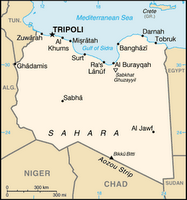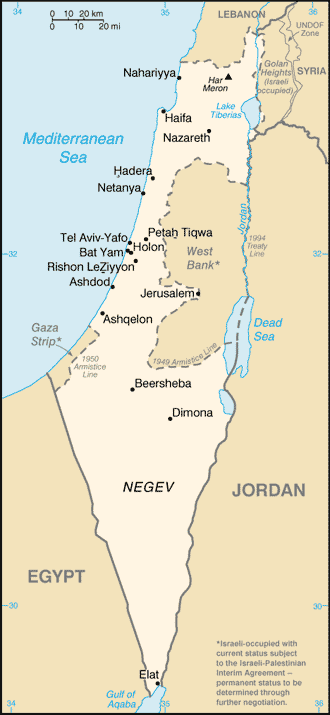Technorati Tags: State Department and Secretary of State or Libya and President Bush, or renunciation of terrorism and Tripoli or Condoleezza Rice, or weapons of mass destruction and Libyan,, or Col. Muammar Abu Minyar al-QADHAFI,
U.S. Diplomatic Relations with Libya, Secretary Condoleezza Rice, Washington, DC, May 15, 2006
 | I am pleased to announce that the United States is restoring full diplomatic relations with Libya. We will soon open an embassy in Tripoli. |
In addition, the United States intends to remove Libya from the list of designated state sponsors of terrorism. Libya will also be omitted from the annual certification of countries not cooperating fully with United States' anti-terrorism efforts.
We are taking these actions in recognition of Libya's continued commitment to its renunciation of terrorism and the excellent cooperation Libya has provided to the United States and other members of the international community in response to common global threats faced by the civilized world since September 11, 2001.
Today's announcements are tangible results that flow from the historic decisions taken by Libya's leadership in 2003 to renounce terrorism and to abandon its weapons of mass destruction programs. As a direct result of those decisions we have witnessed the beginning of that country's re-emergence into the mainstream of the international community. Today marks the opening of a new era in U.S.-Libya relations that will benefit Americans and Libyans alike.
Just as 2003 marked a turning point for the Libyan people so too could 2006 mark turning points for the peoples of Iran and North Korea. Libya is an important model as nations around the world press for changes in behavior by the Iranian and North Korean regimes -- changes that could be vital to international peace and security. We urge the leadership of Iran and North Korea to make similar strategic decisions that would benefit their citizens.
For Libya, today's announcements open the door to a broader bilateral relationship with the United States that will allow us to better discuss other issues of importance. Those issues include protection of universal human rights, promotion of freedom of speech and expression, and expansion of economic and political reform consistent with President Bush's freedom agenda.
2006/493
Released on May 15, 2006
BACKGROUND: From the earliest days of his rule following the 1969 military coup, Col. Muammar Abu Minyar al-QADHAFI has espoused his own political system, the Third Universal Theory. The system is a combination of socialism and Islam derived in part from tribal practices and is supposed to be implemented by the Libyan people themselves in a unique form of "direct democracy." QADHAFI has always seen himself as a revolutionary and visionary leader.
He used oil funds during the 1970s and 1980s to promote his ideology outside Libya, supporting subversives and terrorists abroad to hasten the end of Marxism and capitalism. In addition, beginning in 1973, he engaged in military operations in northern Chad's Aozou Strip - to gain access to minerals and to use as a base of influence in Chadian politics - but was forced to retreat in 1987. UN sanctions in 1992 isolated QADHAFI politically following the downing of Pan AM Flight 103 over Lockerbie, Scotland.
Libyan support for terrorism appeared to have decreased after the imposition of sanctions. During the 1990s, QADHAFI also began to rebuild his relationships with Europe. UN sanctions were suspended in April 1999 and finally lifted in September 2003 after Libya resolved the Lockerbie case. In December 2003, Libya announced that it had agreed to reveal and end its programs to develop weapons of mass destruction, and QADHAFI has made significant strides in normalizing relations with western nations since then.
He has received various Western European leaders as well as many working-level and commercial delegations, and made his first trip to Western Europe in 15 years when he traveled to Brussels in April 2004. QADHAFI also finally resolved in 2004 several outstanding cases against his government for terrorist activities in the 1980s by compensating the families of victims of the UTA and La Belle disco bombings.
CIA FactbookRelated: Keywords State Department, Thursday, May 11, 2006
State Department Podcast, VIDEO and Text 05/11/06, Wednesday, May 03, 2006
Secretary Rice, James Wolfensohn, Gaza Disengagement (PODCAST), Thursday, April 27, 2006
Remarks at Stakeout Secretary Condoleezza Rice, Friday, April 21, 2006
Secretary Rice to Travel to Europe, Friday, April 21, 2006
The Face of the State Department (VIDEO), Thursday, April 13, 2006
Secretary Rice Holds Talks with Equatorial Guinean President, Tuesday, April 11, 2006
State Department Podcast, VIDEO and Text 04/10/06, Wednesday, April 05, 2006
State Department Podcast, VIDEO and Text 04/03/06, Thursday, March 30, 2006
State Department Podcast, VIDEO and Text 03/29/06, Monday, April 03, 2006
Secretary Rice With Foreign Secretary Straw, Baghdad, Friday, March 31, 2006
Rice in Berlin To Discuss Iran with P-5 plus 1, Friday, March 31, 2006
UNHCR Worker’s Death in Sudan Attack, Friday, March 31, 2006
Statement on China's treatment of Kim Chun-Hee, Thursday, March 30, 2006
State Department Podcast, VIDEO and Text 03/29/06, Thursday, March 23, 2006
State Department Podcast, VIDEO and Text 03/22/06,












